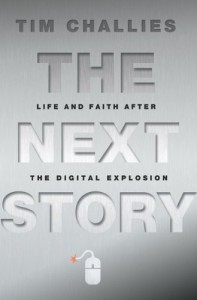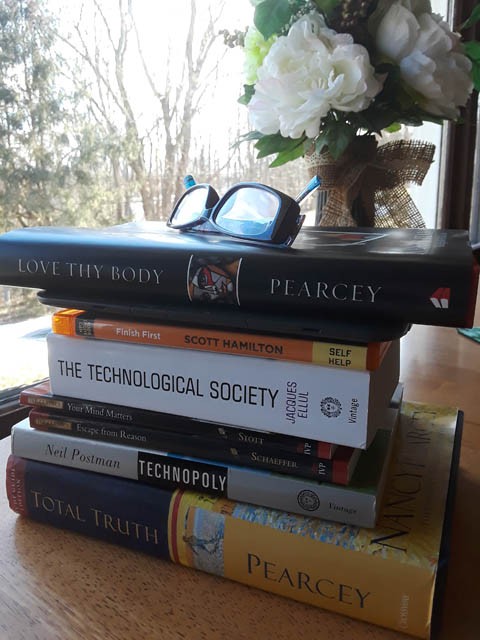The Next Story
 Tim Challies’ The Next Story: Life and Faith After the Digital Explosion is a very satisfying read for anyone interested in a Christian perspective on the digital age. How do our high-tech devices represent a unique challenge for people of faith? How should we think about them? What can we learn from God’s Word on the subject? And finally, how should we then live?
Tim Challies’ The Next Story: Life and Faith After the Digital Explosion is a very satisfying read for anyone interested in a Christian perspective on the digital age. How do our high-tech devices represent a unique challenge for people of faith? How should we think about them? What can we learn from God’s Word on the subject? And finally, how should we then live?
I’ve been interested in this subject for the last few years and have delved into a few books about it: Neil Postman’s Technopoly and Amusing Ourselves to Death, Nicholas Carr’s The Shallows, Jesse Rice’s Church of Facebook, Sherry Turkle’s Alone Together, Sven Birkerts’ The Gutenberg Elegies. Before all of them I had become pretty familiar with the critical lens Wendell Berry applies to things technological. All have raised sobering questions and provided fascinating insight into technology and its impact, but only one of these books is written from a distinctly Christian perspective. Like many of us, I’ve been piecing together my own views and seeking to develop my own practices as not just a modern person in a technological world, but a Christian modern person.
The Next Story has been very helpful to me because it raises the very questions I’ve been asking and works through them in a systematic way. Through the tri-focal lens of theory, theology, and experience, Tim Challies examines such subjects as digital history, communication, machine-mediated identity, distraction, information overload, truth and authority, and the tension between visibility and privacy. He returns again and again to what Scripture teaches as the foundational truth from which Christians live.
I disagreed on one point: I am not convinced that technology is God’s gift to us. It doesn’t appear on the scene until after the Fall, and that’s because it was not necessary before; we lived in unity with God and with Creation, and we did not need the mediation of machines to relate to either. We didn’t need to manipulate our surroundings in order to fulfill God’s purpose for us to steward the Creation. But in the end this quibble didn’t matter that much. Whether you believe technology was part of God’s original plan and developed problems after the Fall, or see it as a result of the Fall, doesn’t really change much about the situation we find ourselves in now or the issues that we face interacting with technology.
I have two favorite sections. The first is on the “new Gnosticism” of the internet. Gnosticism posed one of the first doctrinal challenges to Christianity with its teaching that the body is bad but the spirit is good, and I found it fascinating to see how our various ways of communicating digitally promote a similar idea by allowing us to send our selves “out there” without our bodies in ways that feel very meaningful to us. My other favorite section was on truth and authority in the digital world vs. the Scriptural notions of truth and authority. Truth for Google is determined by relevance; authority for Wikipedia is determined by consensus. Both entities have tremendous stature on the web, and for Christians it’s vital to understand the difference between their ways of conceiving truth and authority and the Bible’s.
When a book like this comes out, its defenders usually hasten to identify the author as someone who is “not a Luddite.” It seems that credibility is enhanced by being involved with these technologies, rather than by being overly critical. Tim Challies is a web consultant who runs one of the most popular blogs out there. He is well-versed in the technologies he discusses here, and at first I was skeptical because of this. How could a web consultant maintain any critical distance? My defensive walls lowered as I read The Next Story. It raises all the important questions in an engaging and readable way, and though not unduly harsh it is does apply a critical lens. Further, its author is someone who has done his share of wrestling to define a soul-sustaining relationship to technology. He explains his purpose this way:
I have deliberately tried to be more descriptive than prescriptive. I cannot tell you how you should live your life, and I certainly don’t pretend that I know how to legislate the best way to live with technology in your home, with your family, at your job, or in your church. I want you to take what’s true and have these things shape your relationship with technology in a way that suits your unique situation.
It’s pretty common for evangelicals to subscribe to the notion that the church should always incorporate the latest and greatest of technologies in order to be “relevant” in our “packaging” of the faith. The Next Story represents a check to this kind of thinking because it reminds us that it’s God who supplies the “package” through His Word and His church. It is an excellent introduction to some of the issues involved in working out what that means in practice.
Other tidbits:
I’ve gleaned some new titles and resources to explore from the bibliography, including God’s Technology, a DVD series from David Murray of HeadHeartHand Ministries. (I just missed a giveaway of this resource over at Tim Challies’ blog, in fact.)
Here is a video of Challies talking about some of the subjects in his book.



4 Comments
Carrie, Reading to Know
I figured you would get in to this book. I’ve been looking forward to your concluding thoughts on the matter (as much as they conclude, I do realize.) As you know, I really like Tim Challies and so I would at some point very much like to read this book. I like that he concludes with the notion that every family has to decide for themselves how to best utilize technology in their own home. I think that’s an excellent point to make and I appreciate it!
Jess
This is really interesting. After reading Berry lately I am especially struggling with the use of technology and especially the internet in our lives. I tend to waffle between thinking I should drastically reduce my use of it, and believing that all things can be redeemed if submitted to Christ. I’m sure the conversation will continue.
Janet
Jess, you might find this interesting: http://www.jesusradicals.com/wp-content/uploads/computer.pdf It’s an essay of Berry’s called “Why I Am Not Going to Buy a Computer.” It’s a copy of the original essay, published in Harper’s Magazine in 1988, complete with a bunch of readers’ replies and then Berry’s response. It’s entertaining… almost like he’s baiting his audience.
Even for people who don’t share his thinking on every point (like me, apparently, given that I’m writing this on a computer), it’s pretty remarkable for being so far ahead of the curve in estimating some of the hidden costs of technology.
bekahcubed
As one of Challies’ blog readers, I’ve been eager to read this book for a while–and am even more eager having read your review. I have mixed feelings about the role of technology in life, but haven’t necessarily taken the time to sit down and process through them all–especially not in light of my relationship with God.